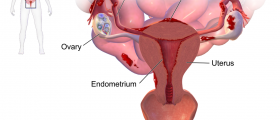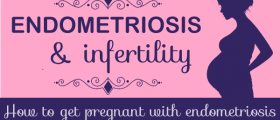
Endometriosis can affect different tissues and organs inside a woman’s body, including the fallopian tubes or ovaries. These organs are, in fact, the most commonly found to be affected by this condition when endometriosis can prevent ovulation or block the fallopian tubes. In both cases, endometriosis can significantly compromise fertility.
Women suffering from endometriosis are also found to be exposed to greater risk of miscarriage, pre-eclampsia and intrauterine growth retardation. All these problems are linked to increased level of antiphospholipid antibodies (or just APA) and its effects the to immune system. Aspirin or low dose heparin can be the treatment for increased level of APA. Some women may be beta 3 deficient and this can be the cause of endometriosis and infertility as well. There are several other possible explanations of infertility due to endometriosis, such as poor quality eggs and increased number of macrophage cells (natural scavenger cells) in the peritoneal fluid. Macrophages can kill the sperm, eggs or even embryo, leading to fertility problems.
Even if endometriosis does not affect these organs, it can still cause implantation difficulties and problems with the immune system. Recent studies have concluded that even just minimal or mild endometriosis can cause fertility problems, so laparoscopic surgery may be helpful for these women.
Can Someone Suffering from Endometriosis Conceive?
Yes, woman suffering from this condition can conceive and doctors believe that most of these patients can have a child if they want to. Some endometriosis patients are able to conceive naturally, while others might need surgical procedure to increase their chances to become pregnant. If neither of these works, women may consider assistive reproductive techniques (in vitro fertilization or intrauterine insemination).
Are Treatments Efficient?
There are different drugs prescribed for endometriosis but their results vary greatly. Some women experience certain improvement but once the drugs are discontinued, the symptoms usually reappear. Besides that, these medications may also cause many adverse effects.
Surgical laparoscopic treatment may increase the chances for pregnancy for some 13%. In one recent study, 50 of 172 women became pregnant within 36 weeks of their laparoscopic endometriosis treatment. The percentage may be higher, but there are no large scale studies on the results of assistive reproductive techniques on endometriosis patients. Most patients believe that the skills and experience of the surgeon performing laparoscopic surgery determine the success and fertility after the treatment.
Some time ago, hysterectomy was very common treatment for endometriosis. However, these days it is recommended only to patients in whom other treatments have proven to be unsuccessful and the pain is severe.
















Your thoughts on this
Loading...